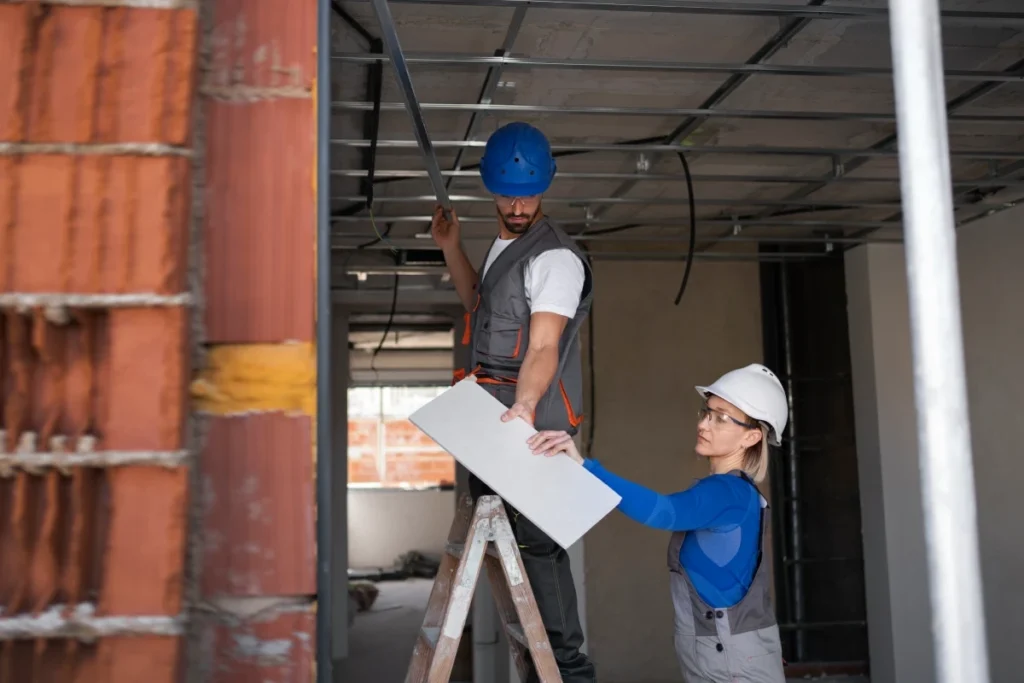Renovating a house is an important decision that requires planning, budgeting, and patience. If you’re considering a full renovation, you may be wondering: “How long does it take to renovate a house?” The answer depends on various factors, such as the size of the home, the scope of the work, the availability of materials, and the management of permits.
In this article, we will analyze all these aspects in detail and provide a realistic estimate of how long your renovation might take. Additionally, we’ll share some tips to speed up the process and avoid unnecessary delays.

Factors That Influence the Duration of a Renovation
Before determining the exact time required for a house renovation, it is important to understand the factors that can affect its duration.
1. Size and Type of Home
Renovating a small apartment is not the same as renovating a multi-story house. The larger the area, the longer it will take to complete the work.
- Small apartments (40-70 m²): 2 to 3 months.
- Medium-sized homes (80-120 m²): 3 to 4 months.
- Large houses (over 150 m²): 5 to 6 months or more.
2. Type of Renovation
- Surface-level renovations: Includes painting, flooring replacement, or furniture updates. They can take between 2 and 6 weeks.
- Full renovations: When modifications involve plumbing, electrical systems, structure, and space distribution, they can extend from 3 to 6 months.
3. Obtaining Permits
In cities like Barcelona, some renovations require municipal permits, which can delay the start of the work by 1 to 3 months.
4. Availability of Materials and Professionals
Delays in material supply or high demand for professionals can slow down the project. Choosing readily available materials and working with a well-coordinated team is key.
Phases of a Full Renovation and Their Estimated Duration
To better understand the total renovation time, here’s a breakdown of the process into phases:
1. Planning and Design (2 to 4 weeks)
- Creating floor plans.
- Selecting materials.
- Applying for permits.
- Budgeting and hiring professionals.
2. Demolition and Preparation (1 to 2 weeks)
- Tearing down walls and removing old elements.
- Preparing the space for the new layout.
3. Plumbing and Electrical Installations (3 to 6 weeks)
- Updating electrical and plumbing systems.
- Installing heating and air conditioning.
4. Masonry and Structural Work (4 to 6 weeks)
- Building walls and partitions.
- Applying coatings and insulation.
5. Finishing and Carpentry (4 to 6 weeks)
- Installing floors and tiling.
- Painting and assembling furniture.
6. Cleaning and Final Touches (1 week)
- Deep cleaning.
Inspecting for defects and making final adjustments.
Tips to Reduce Renovation Time
While some steps are unavoidable, there are ways to optimize the timeline:
- Plan in Advance: A well-planned project reduces unforeseen issues and delays. Clearly define what you want to renovate, set a realistic budget, and work with an architect or designer to anticipate each step. The more detailed the plan, the fewer last-minute changes will be needed, preventing unnecessary setbacks.
- Choose Fast-Delivery Materials: Some materials take weeks to arrive if they are imported or custom-made. Opt for readily available options that maintain quality. Check with suppliers before starting the project to ensure everything is available when needed.
- Work with a Professional Team: Hiring an experienced renovation company can significantly impact execution times. A professional team will coordinate different work phases efficiently, minimize mistakes, and handle any unforeseen events effectively. This prevents delays due to lack of planning or execution errors.
- Apply for Permits Early: Depending on the type of renovation, you may need a construction permit. In Barcelona, permit processing can take weeks or even months. Start this process early so it doesn’t become an obstacle when you’re ready to begin the renovation.
- Maintain Clear Communication with Workers: Miscommunication can lead to significant delays. Hold regular meetings with the renovation team to ensure everything is progressing as planned. Quickly resolve doubts and make prompt decisions to prevent the project from stalling due to unclear instructions.
- Be Flexible and Have a Backup Plan: Even with detailed planning, unforeseen issues such as hidden structural problems or material delivery delays can arise. Having alternatives ready—such as substitute materials or alternative solutions—will help maintain the renovation schedule without wasting time.
- Organize Work by Zones: Structuring the work by areas can speed up the process. Instead of working scattered throughout the entire house, it is more efficient to complete one section before moving to the next. This allows professionals like electricians and painters to work simultaneously without interference.
Renovating with Solera Reformas in Barcelona
At Solera Reformas, we have extensive experience in full home renovations in Barcelona. We specialize in personalized projects, meeting agreed-upon deadlines, and ensuring high-quality results.
- Transparent pricing: No hidden costs.
- Guaranteed deadline compliance: We stick to the schedule.
- High-quality materials and finishes.
- Highly qualified team of professionals.
If you’re thinking about renovating your home, contact us, and we’ll help bring your project to life in the most efficient way, without surprises.




